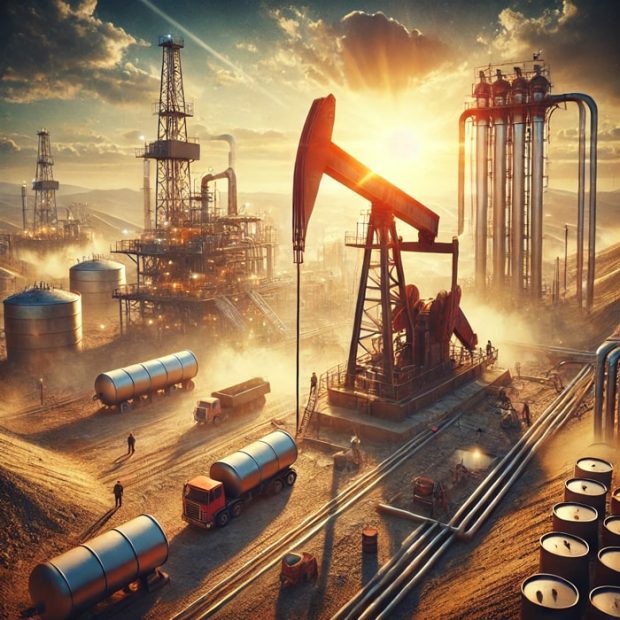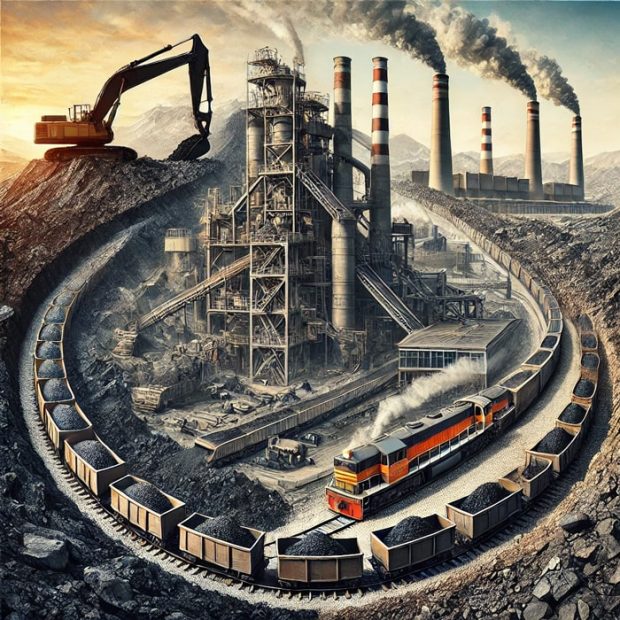Fossil fuels have been one of the most important sources of energy in human life for a long time. These resources include oil, coal and natural gas, which were formed millions of years ago from the decomposition of plant and animal remains in the earth’s layers. The energy obtained from these fuels has been the main driving force of many industrial and economic developments in the world, and today they still play a vital role in meeting our daily needs.
Although fossil fuels are considered the main source of energy in the modern world, challenges such as environmental pollution and climate change caused by the widespread use of these resources have pushed the world to use more sustainable energy sources. In this article, we will take a journey from oil to natural gas to examine the role of these fuels in their lives today and in the future.
oil

The history of oil extraction and use goes back hundreds of years, but the widespread exploitation of this resource began in the 20th century and became one of the main pillars of the global economy. Oil, as a portable energy source, became the foundation of the industrial revolution and the development of transportation infrastructure.
Today, oil is used in various industries such as the production of automobile, aircraft and ship fuels, as well as in the petrochemical industry to produce important products such as plastics, chemicals, agricultural fertilizers and detergents. Due to its wide applications, oil has a very high strategic value, and many major world economies are based on its production and export.
Environmental effects of oil
Water pollution: One of the biggest environmental challenges related to oil extraction is spillage and pollution of water resources. When oil is extracted from wells, there is a high possibility that it will leak into groundwater or rivers and seas. Oil spills in the seas, such as the famous oil disaster in the Gulf of Mexico, destroy marine ecosystems. Petroleum substances can float on the surface of water and prevent the exchange of oxygen between water and air, which ultimately causes suffocation and death of fish and other aquatic organisms.
Soil pollution: Oil drilling activities can cause soil pollution. Soil pollution caused by oil spills and chemicals related to drilling processes leads to a decrease in the quality of agricultural land and destruction of natural environments. This type of pollution can be long-term and the restoration of the damaged soil requires considerable time and costs.
Emission of greenhouse gases:
Carbon dioxide (CO2): Burning oil, as one of the main sources of energy production, releases a huge amount of carbon dioxide into the atmosphere. This gas is one of the main factors of global warming and climate change. Oil combustion in cars, power plants and factories directly leads to an increase in CO2 concentration in the atmosphere and has negative effects on climate change.
Methane (CH4): The process of extracting and transporting oil can also cause methane gas leaks. Methane is a much more potent greenhouse gas than carbon dioxide, with greater warming potential, although it has a shorter lifetime in the atmosphere. Methane leakage is a major environmental concern, especially during oil extraction and storage operations.
Environmental incidents and oil spills:
Oil disasters: Oil spillage is one of the biggest environmental risks, especially in sea transportation from oil tanker tanks. These incidents, such as the Exxon Valdez or Deepwater Horizon oil spills, have caused enormous damage to marine ecosystems, and the cleanup process takes years. Sea creatures, birds and even coastal plants are at risk of death due to contact with oil substances.
Deforestation and destruction of habitats:
Destruction of natural environments: Oil extraction in areas such as rainforests and sensitive natural areas, such as the Amazon, leads to deforestation and destruction of animal and plant habitats. In addition to the destruction of biodiversity, these destructions reduce the absorption of carbon dioxide by forests and ultimately accelerate climate change.
Air pollution and human health:
Toxic chemicals: Oil refining and use processes can lead to the release of toxic chemicals such as benzene, formaldehyde and sulfur dioxide, which have negative effects on human health. These substances can cause respiratory diseases, cancer and cardiovascular problems. Air pollution is a major problem in big and industrial cities that are highly dependent on fossil fuels.
Coal: the driving force of the industrial revolution


Coal, as one of the oldest sources of energy, played a key role in the formation of the industrial revolution in the 18th century. Before the emergence of new energies such as oil and natural gas, coal was the most important fossil fuel used for energy production. Steam engines that powered factories, trains, and ships were primarily powered by coal. This caused coal to quickly become the main source of energy in Europe and America.
Today, although the consumption of coal has decreased in many parts of the world, it still plays a significant role in the production of electricity and heating. Large countries such as China and India still widely use this fossil fuel and a major part of their electrical energy comes from coal-fired power plants.
Applications of coal:
Thermal power plants that use coal to generate electricity are still the main source of energy production in many countries. Coal is also used as a raw material in the steel and cement industries. One of the advantages of coal is that it can be easily stored and transported, especially in areas that do not have access to other natural resources such as natural gas.
Environmental effects of coal:
Burning coal produces a large amount of carbon dioxide (CO2). Coal-fired power plants are one of the biggest sources of greenhouse gas emissions. Increasing the level of carbon dioxide in the earth’s atmosphere directly contributes to climate change and global warming.
In addition to carbon dioxide, burning coal produces pollutants such as sulfur dioxide (SO2), nitrogen oxides (NOx) and particulate matter. These substances contribute to the formation of acid rain and air pollution and cause respiratory problems and chronic diseases in humans.
Extraction of coal from mines leads to pollution of water resources. In the coal mining process, toxic substances such as mercury and arsenic may enter rivers and lakes and lead to drinking water pollution and the destruction of aquatic ecosystems.
Coal mines, especially open pits, cause extensive land degradation and destruction of natural habitats. Coal mining activities lead to deforestation, soil erosion and biodiversity loss. In addition, the mining process can cause landslides and serious risks for local communities.
Ash from burning coal contains toxic substances that can leach into soil and groundwater if not managed properly. These industrial wastes are a serious threat to the environment and human health.
Natural gas: the cleaner fossil fuel
natural gas It is known as one of the most important sources of energy in the 21st century. This fossil fuel that is mainly from methane (CH4) is formed, it is much cleaner and environmentally friendly than oil and coal. In recent years, natural gas has become the main source of energy supply in many countries due to less emission of greenhouse gases and greater efficiency.
Advantages of natural gas:
One of the biggest advantages of natural gas compared to other fossil fuels is that it emits less carbon dioxide (CO2) when it is burned. In fact, natural gas produces about 50-60% less carbon dioxide than coal and oil. This issue has caused many countries, especially in the field of electricity production, to change their power plants from coal fuel to natural gas to help reduce greenhouse gas emissions.
Natural gas has a higher efficiency in energy production and can be used well in modern power plants. This higher efficiency means producing more electricity with less fuel consumption and thus reducing costs and emissions.
In addition to electricity production, natural gas is used in various industries such as chemical fertilizer production, heating of houses and buildings, and even as vehicle fuel (CNG). Also, in the petrochemical industry, natural gas is used as a raw material for the production of plastics and chemicals.
Environmental effects of natural gas:
Despite lower CO2 emissions than coal and oil, natural gas still has its own environmental disadvantages. One of the main problems methane leak It is used in natural gas extraction, transportation and storage processes. Methane, although shorter-lived in the atmosphere, has a global warming effect about 25 times greater than that of carbon dioxide. Therefore, leakage of even small amounts of methane can have significant negative effects on climate change.
One of the common methods for extracting natural gas from underground layers is the process Hydraulic break It is called “fracking”. Although this method has increased the access to natural gas reserves, it has environmental criticisms. The fracking process can lead to groundwater pollution, ground tremors, and toxic chemical leaks. Also, using a lot of water in this method is one of its main problems.
In some areas where natural gas transmission equipment is not well maintained, the possibility of gas leakage and other pollutants such as Volatile organic compounds (VOC) that can lead to air pollution. In addition to environmental threats, this issue also creates risks for human health, including respiratory problems and increased risk of heart and lung diseases.
Liquefied petroleum gas (LPG): a compact and versatile fuel
liquid gas or LPG (Liquefied Petroleum Gas) is a type of fossil fuel that mainly consists of a combination of propane and Bhutan It is formed and stored and transported as a liquid. This gas is produced in the process of refining crude oil or extracting natural gas, and due to its special characteristics, especially the ability to store and transport easily, it has become a widely used fuel in various sectors.
Liquefied petroleum gas (LPG) is one of the popular energy sources due to its portability and easy storage. This gas is easily stored under low pressure in tanks and transported as a liquid, which makes it a suitable option for areas without access to natural gas networks. Also, LPG burns cleaner and produces less carbon dioxide than coal and other fossil fuels, making it an ideal fuel for improving air quality in residential and industrial environments.
For the use of liquefied gas in industry and places that do not have access to the city gas network, such as villas and gardens, usually from Liquid gas tank These tanks are produced in different sizes and capacities. And usually, in the process of making them, mandatory standards must be observed. For more information, you can visit the Hosni Gas Tank website
LPG gas is a multi-purpose fuel that is used in various parts of life, including cooking, heating, power generation, and vehicle fuel. In developing countries, LPG is recognized as a sustainable solution to replace polluting fuels such as coal and wood in cooking. Also, LPG is used as a fuel and raw material in various industries such as metalworking, glassmaking, and petrochemicals, and its high efficiency has increased its attention in transportation and electricity generation.
conclusion
Fossil fuels, including oil, coal, natural gas and LPG, have long played an essential role in global energy supply. These resources are used in many industries and domestic sectors due to their specific advantages such as high efficiency, portability and storage, and relatively low costs. However, serious challenges such as climate change, air and water pollution, and resource depletion have become a serious issue over time.
According to recent developments and global concerns about the negative effects of fossil fuels on the environment, the future of energy is moving towards sustainable and renewable sources. Solar, wind and hydropower are considered as the main alternative options. Nevertheless, natural gas and LPG are considered as transition fuels and effective in the transition process to renewable energies.
Development of new technologies such as Liquefied gas (LNG) tanks And natural gas leak control methods can help reduce the negative effects of fossil fuels and lead to improved air quality and reduced greenhouse gas emissions. Considering the urgent need for energy in the future, it will be necessary to focus on sustainability and reducing environmental impacts, especially in countries that are heavily dependent on fossil fuels.
This article examined different aspects of fossil fuels, their effects on the environment and the future of energy. It is hoped that by increasing awareness and using new technologies, we can move towards a sustainable and cleaner future.
RCO NEWS















